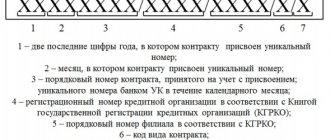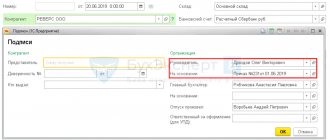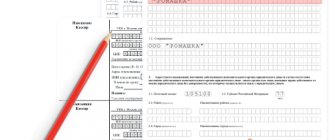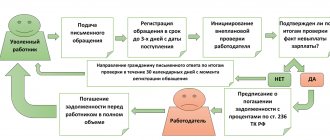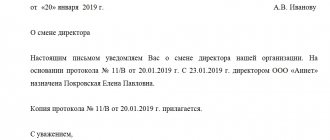Filing a complaint: description of grounds
The current norms of the Labor Code describe the provisions that can be used when drawing up complaints. According to the law, each member of the team has rights that cannot be violated. The same applies to leaders.
Violation of labor rights refers to direct violations of the current law. This means there is a reason to complain about a person who behaves inappropriately.
Collective complaints against bosses are filed for the following reasons:
- Unlawful dismissal due to violations that did not occur.
- Refusal to pay for additional overtime work, new responsibilities.
- Refusal to promote a citizen, although there are grounds for this.
- Refusal to pay for sick leave provided.
- Overtime work, about which there were no agreements.
- Refusal to provide vacation days.
- Refusal from official employment.
- Lack of required cash payments and bonuses.
It is worth carefully studying the Labor Code before filing a complaint against your manager. Only then do they draw up the petition itself, excluding the possibility of dismissal due to slander.
Managers may violate labor and civil rights. Such actions include:
- harassment;
- use of brute physical force;
- pressure, voicing threats;
- profanity;
- rude and boorish behavior.
On these grounds, ordinary class complaints and statements of claim are filed for trial. Additionally, a demand is made to compensate for moral damage in a certain amount.
Janitors read out a complaint against the despot director in this video:
How to contact senior management
The most effective and efficient is a collective complaint.
Interpersonal conflicts between some subordinates and the boss can be regarded as a biased attitude of one side or another, therefore it is most often perceived as a subjective slander against the boss. But if the entire team complains about the manager, it will not go without due attention. The initial step in getting out of a conflict situation with a manager is to start by contacting your superiors. Collective written communication with confirmed facts of unacceptable behavior in oral form will definitely yield results. An additional insurance document confirming the intention to resolve all controversial issues at the local level will be a copy of the appeal to management.
The consequences of filing a claim may vary. After the trial, which must be held by senior management, several possible decisions can be made:
- Peaceful resolution of conflict between staff and management;
- Material punishment of the manager, possibly with removal from office or transfer to another unit;
- Dismissal of a manager due to incompatibility with the position held.
If the memo did not affect the situation, then you can contact the prosecutor’s office or the labor inspectorate with a complaint. Then a memo will also come in handy, which must be certified by the management reception secretary.
The rules of business correspondence require you to indicate your personal data when contacting. Therefore, an application without a signature and indication of your data will not be considered. But when drawing up a claim, if the initiator does not want management to know his full name, he must indicate the anonymity of the claim in the text of the appeal.
Basic rules for writing documents corresponding to business correspondence:
- Indication of the structure and position of the responsible person where the plaintiff is applying;
- Indication of the name, address and telephone number of the person applying, if a collective request, then the name of the unit;
- A clear statement of the problem in Russian;
- Request for help in resolving a problem;
- Description of the attached documents;
- Date and signature of all participants in the complaint.
There are two types of complaints - collective and individual.
The greatest effect is when drawing up a complaint from the entire team. In this case, such a paper should be drawn up on behalf of members of the work team who suffered from the actions of their leader. If there are only a few such people, then the complaint is drawn up on their behalf. You must also indicate the specific reasons for filing the complaint.
See below for an example of filling and paper form.
The complaint is signed with the positions and initials of the members of the initiative group included. The date of its compilation is indicated at the end of the paper.
Filing a complaint can be anonymous, but this kind of paper is rarely considered by senior management.
Often, when there are unlawful actions on the part of management, people have the question: “Where can I complain about my boss?”
As a rule, in teams, the initiative group immediately wants to send a complaint directly to the police or prosecutor's office in the hope of intimidating their boss.
A much more effective method is to complain about the manager to a higher organization, which is the parent structure for a particular company.
Senior management, having weighed the loss of profit that arose against the backdrop of discord within the team, will most likely take certain actions against the unscrupulous boss. Often, a response to such a request comes within one week from the moment it is submitted.
Submitting such papers to government agencies most often only brings harm to commercial organizations. It must be remembered that such documents become the reason for government inspections, which will only damage the reputation and final profit of the organization.
It is better to try to resolve the conflict with the participation of the top management of the enterprise than through the courts. If representatives of the company’s senior management do not react in any way to discord in the team, then it would be correct to contact state fiscal structures to resolve the problem.
Government agencies will take the side of the injured persons if evidence of harm caused to the employee is presented.
The reason to complain to your superiors may be any infringement of labor rights or human rights. The labor rights of an employee are the rights of a person in an employment relationship that relate specifically to these relationships.
Accordingly, infringement of an employee’s rights is a violation of the boss’s labor duties to the employee. The rights of an employee are fixed by an employment contract, and, globally, by the Labor Code of the Russian Federation. And, if the manager violates these rights, then he violates the contract, which is definitely a reason to complain about him.
The most common reasons for complaints due to violation of an employee’s labor rights are the following:
- refusal to pay a bonus to an employee when the latter actually deserves it;
- refusal of official registration;
- refusal to grant leave to an employee;
- the manager forces the employee to spend more time at work than specified in the employment contract, but does not pay for overtime hours;
- refusal to pay sick leave if the employee has the right to paid sick leave under the contract and the case in question complies with the terms of the contract;
- denial of promotion when there is an opportunity for it, but there are no compelling arguments against it;
- refusal to increase wages due to an increase in the employee’s duties;
- dismissal motivated by actions that the employee did not commit, or reasons that are not specified in the employment contract and the Labor Code of the Russian Federation (Article 81).
Thus, in principle, you can write a collective complaint against a manager not only for failure to fulfill direct duties to an employee, but also for controversial issues (about promotions or salary increases).
But it is worth carefully weighing the pros and cons before submitting an application of this nature.
Is your boss really wrong and downplaying your professional qualities, portraying you as an employee who does not deserve certain privileges?
You need to write a statement only when you are 100% sure that you are right and deserve more. Otherwise, after consideration by management, your requests will not be satisfied. In addition, you will most likely earn a bad reputation, which can significantly affect the future attitude of management towards you.
We suggest you read: Return loan insurance from Orient Express Bank
In addition to violation of labor rights, the reason to complain about a manager may also be a violation of human rights. In other words, the management’s inappropriate attitude towards the employee as a person. These reasons could be:
- rudeness, rudeness;
- disrespectful attitude;
- using obscene language towards an employee;
- threats to the employee;
- insulting an employee or his relatives, friends, etc.;
- assault towards an employee;
- sexual harassment of an employee.
There are some peculiarities here. Firstly, such behavior of the boss contributes to the deterioration of the microclimate in the work team, which, in turn, entails a decrease in work efficiency. And management is always interested in obtaining maximum benefits.
Secondly, if the complaint is not satisfied, the employee can file a lawsuit against the manager. And, since this is a consequence of certain aspects of the labor relationship between the plaintiff and the defendant, there is a high probability that the company will be affected by this case.
This can seriously affect the reputation of the organization, so it is only in the hands of management to remove such a boss from his position. However, how the application is written also plays a role. If the above points and the employee’s willingness to take the case to court or the relevant authorities are clear from the text, the likelihood that management will take the employee’s side will increase significantly.
A collective complaint is written not by one employee, but by the entire group of people working under the supervision of a certain person. The application is usually written to this person. Such a statement will carry much more weight before management. This will very likely eliminate doubts that the employee is actually in the wrong and is blaming the boss groundlessly.
When a collective complaint against the head of a department is filed by employees of a government agency with the appropriate body, such appeals are subject to special consideration. The responsible authority is obliged to pay attention to the grievances of workers and carry out the necessary checks. During these checks, most likely (if the complaints against the boss are justified), the alleged violations will be revealed.
Dissatisfaction with the entire team with one leader is a very big indicator in any case. However, this is not such a common occurrence.
This is due to the fact that many in the group of workers are afraid that they will be fired because they wrote it.
It is very important to set up a team, because the probability of success is really high and the more people sign the application, the higher this probability.
A collective complaint against a boss is a sample.
A collective complaint against a manager is a sample for filing with government agencies.
Another sample complaint against the boss of a tyrant to be sent to the Labor Inspectorate.
The complaint must be submitted to persons whose superiors are subordinate to them. If the outcome is unsatisfactory, it can be submitted higher - adding that the immediate management of the boss ignored the application. This way it can reach the owner of the enterprise. In cases where this does not help, you can submit an application to the following authorities:
- State Labor Inspectorate.
- Prosecutor's office.
Where can I complain?
The main thing is to correctly indicate the addressee. Typically, this function is performed by a control body, the head of an enterprise, or the head of a specific department. Only if the recipient is correctly identified will the complaint be promptly considered, and the process itself will not raise questions.
There are the following authorities that have the right to accept documents:
- senior management;
- court;
- Labour Inspectorate;
- prosecutor's office
How and where to file a collective complaint against a manager
In a situation where the director manages the business individually, and is also the owner, there is nothing left to do but take the long route. You can start with the labor inspectorate of Rostrud in your region. If the result of her inspection did not satisfy all members of the team, then you can continue the fight and write a collective complaint against the manager to the prosecutor’s office.
We recommend reading: Conditions for obtaining Russian citizenship
It may happen that the prosecutor's investigation did not complete the case. At this point, the stage of writing collective complaints ends, because workers have only one path left - to the court, and here only personalized claims against the actions of the boss are accepted from each applicant separately. The only thing the court can do is to consolidate the consideration of these claims based on similar circumstances.
Standard design rules
Complaints can be individual or collective. The last variety gives the maximum effect. Then the sender becomes all members of the team who were dissatisfied with the boss’s action. Or, several employees whose rights and interests were directly violated are appointed as the main compilers.
The standard form of the document contains the following information:
- Company name, in full form.
- Full name of the manager on whose part the violation was committed.
- The position of the employee, with an exact indication of the full name.
- Reasons for drawing up the document. What rights are violated and how?
- Description of the essence of the problem.
- Date when the violation was committed.
- A requirement regarding what action must be taken by management.
- Date of the application.
- Applicant's signature.
The paper may be accompanied by additional documentary evidence. If necessary, it is permissible to refer to the testimony of witnesses.
How to write a complaint correctly, see here:
What points should be included in the document?
A more effective tool is considered to be a complaint against the boss to the organization that is the parent structure for the enterprise. The management of a higher structure is able to calculate the possible losses that companies suffer during conflicts within departments.
It is beneficial for him to take action against a manager who violates work norms and rules. And a response to such an appeal can usually be expected within 7 days from the date of submission.
If you need to send a claim to the house management or authorities (regional or central), the response time will be longer. By law, they are 30 days, starting from the date of receipt of a collective or individual complaint.
The labor inspectorate conducts an inspection and issues a fine to both the boss and the enterprise. It also issues an order to address the problem that contributed to the violation. The prosecutor's office is able to initiate a criminal case if there are grounds for this.
It is important to protect your rights as defined by the laws of the Russian Federation. This can be done in different ways; complaints are one of the tools for such activity.
Claims cannot be abandoned, because in a situation where violations go unpunished, the problems get worse.
The most important thing is to carefully approach the collection of evidence and facts regarding the violations described in the appeal. Unfounded complaints remain ineffective; filing them is pointless; this leads to a loss of time and a deterioration in the psychological climate within the organization.
Author of the article:
We suggest you read: Collegial complaint to the prosecutor's office
Evgenia Dolgaya
In cases where the top management of the organization is the owner (and this is in almost all cases when we are not talking about a government organization or service), the complaint is initially written to him.
Accordingly, it will be considered by one of the leaders of the organization or persons responsible for such operations. Who exactly depends on the hierarchy in the company itself and how high the position the employee occupies, how high the boss is, how many layers of management are “above him”.
One way or another, when considering an application, the person doing this can also rely on his own subjective opinion. In other words, whether an employee’s requests will be satisfied depends only on his decision and it is unknown what will motivate it.
But in some cases this decision can be influenced. As mentioned above, management is always interested in profit. Write the text of the complaint against the boss in such a way that it suggests the conclusion that if you change the boss, the benefits will increase. For example, if the manager puts moral pressure on employees.
If you can explain that this has a detrimental effect on the efficiency of work relative to the time spent, then you will increase the chances of a successful outcome of the case. Or if the boss does not motivate employees financially, does not encourage their aspirations and does not reward them for their merits when he has the opportunity.
In theory, this knowledge is not so important, but not in practice. Unfortunately, in our realities we often encounter situations where such relationships develop between a manager and a superior person that everything is forgiven to the former. But presenting facts about the loss of benefits due to the actions of the boss or the threat of litigation will make the manager think - is his relationship with your boss worth these losses?
When it comes to a state structure, you don’t have to think much in this way - the benefit goes to the state, and not to the body that accepts such statements. However, the decision then must be made more objectively - in many cases it is possible to conduct commissions and similar investigations to prove the guilt of the manager.
State inspectorates inspect budgetary organizations with particular care.
It is worth filing a complaint against a manager to a higher organization after making an informed decision and having really good reasons for doing so. One must, one way or another, be prepared for the fact that they will consider, but the requests will not be satisfied, and the consequences of this. Roughly speaking, you need to be prepared for the situation to get even worse and for the pressure from management to increase. But this is not a reason not to defend your rights.
The statement should be drawn up as accurately as possible and not cause an ambiguous attitude towards the actions of the manager.
Here's how to write a complaint against your boss (sample below) or what points to include in the document:
- To whom is it directed? Here or f. And. O. and the position of the superior manager or the name of the body.
- Who is it sent from? F. and. O. and the position held, if it is written collectively - a listing of this data.
- Information about the violation. It is necessary to indicate by whom the rights are specifically violated, his name. And. O. and position. Full information about violations.
- Date of application.
- Signatures of employees who participated in the preparation.
Before filing a complaint, consider again - were your rights violated? Is the boss really wrong? If yes, feel free to write a statement. On the one hand, if the truth is on your side, what doubts can arise? On the other hand, if the statement is ignored, it will demonstrate the bad sides of the organization. And this will give you a reason to think: is it worth collaborating with such people?
Set yourself up correctly, don’t be afraid and don’t think that you’re doing something bad. You are fighting exclusively for your rights. If possible, convince your employees of this and write the statement collectively. Remember, no one should violate your rights, whether they are labor or otherwise.
The written response must indicate not only the proposed solution to the problem, but also the specific time frame within which this solution will be implemented. If a refusal is received in response to a collective complaint, then it must be well-reasoned.
It makes no sense to write a statement to the entire workforce at once. It is better to appoint one responsible employee who will objectively reflect all the circumstances of the case in the complaint, and the remaining employees will simply put their signatures on the finished document. Before drawing up the document, you should take the phone numbers of all employees who will sign the document. This will allow you to easily contact them if necessary to clarify details.
Useful tips
Experts give several recommendations that will help make the document as effective as possible:
- It is better to communicate with the other participants in advance. It's good if you can come to a common opinion.
- Before drawing up collective complaints, contact details of all parties are recorded separately. Then, if necessary, it will be easy to contact to discuss what is happening.
- Collective drafting of a complaint is literally ineffective. It is worth entrusting this procedure to one person. The main thing is to objectively reflect all the circumstances and facts that matter. The remaining participants simply study the document and, if necessary, put their signatures or make appropriate adjustments.
- The text must contain plural personal pronouns.
- The less emotions the better. It is advisable to present only facts and references to legislative standards confirming what has been said.
- The requirements are put forward in the final part.
- The signature sheet of all participants is a required attachment.
Regarding the rejection of a complaint to the labor inspectorate
There are several reasons why a higher authority refuses to consider incoming requests:
- Not all personal information is provided.
- The manager's data is incorrect or incomplete.
- Point of view is only subjective. The document was drawn up on emotions, and there are no compelling arguments in favor of the compiler. And there are no documents confirming existing violations on the part of the manager.
- A large number of errors, the presence of profanity.
- The complaint does not reach the addressee. In this case, it is recommended to send the documents again, adding the appropriate notes.
How to contact the labor inspectorate if your employer has violated your rights? See here:
Key points for filing a collective complaint against a manager (sample)
A complaint is filed with the labor inspectorate against the employer. Or to the prosecutor's office and/or the tax office. Or go to court. But you need to start with less, observing the hierarchy. First, you need to make a collective statement addressed to your superior in writing. Why is it better to work collectively? Individual claims are treated less carefully and scrupulously. And it’s not so easy to dismiss the team. Therefore, a complaint against an employer drawn up together with colleagues will have a more effective effect. Including a complaint to the prosecutor's office against the employer. A sample collective complaint can be used as an example. It is worth noting that not only officially registered employees can file complaints against the manager. You just need to first prove the fact of an employment relationship.
We recommend reading: Where to obtain Russian citizenship
To begin with, it is worth noting that the registration of an individual and collective complaint is practically no different. The only difference is the number of applicants. You can read about how to correctly file a collective complaint and what conditions cannot be ignored on our website in the article of the same name. Before contacting the prosecutor's office, you need to carefully weigh everything. If the reason for the complaint is not significant enough, it is better to try to resolve the conflict peacefully. To do this, you will need to contact higher management. But since not every director wants to wash their dirty linen in public, ordinary workers are not always able to achieve justice. The next stage of complaints is the labor inspectorate closest to the place of employment. How to complain about an employer to this organization can be read below. The prosecutor's office is most often contacted for the following reasons:
What else should you consider when compiling?
Documents can be submitted anonymously. Then you should indicate in advance that information about the compilers is not disclosed. This is especially important when it comes to issues that are important to the operation of the entire enterprise.
Applications are sent in the form of a registered letter, then the senders will know exactly when the document was received by the other party.
Such complaints are reviewed within a month. During this time, the inspectorate must organize a thorough inspection of the enterprise. It is recommended to save the receipts that were issued when sending letters. After a month and a half, the sender receives a response from the labor inspectorate.
The labor inspectorate usually checks the following components of an enterprise's activities:
- the fact that employees are familiar with all documents related to the organization of work;
- personal accounts of subordinates along with wage statements;
- orders from management;
- local acts with employee data, rules on remuneration for labor, internal daily routine;
- pay sheets;
- time sheet;
- vacation schedule;
- staffing schedule;
- personal cards of subordinates;
- reporting on the movement of work books;
- contracts.
No statute provides that an employee can waive his complaint and the related review. The procedure is still mandatory, since it helps to identify administrative offenses.
In any case, the employee can say that the conflict situation has been resolved. This mitigates the punishment of managers, even if serious violations are discovered.
The statement withdrawing the complaint is written in the same form as the complaint itself. First, personal information is indicated for each of the parties. Then there is a description of the essence of the issue. The last elements are the date and paintings.
What answer can the labor inspectorate give?
There may be several options for responding to an appeal to the labor inspectorate:
- Bringing the manager to criminal liability, if there are grounds.
- Temporary cessation of the enterprise's activities until the violations are eliminated.
- Removal of a manager from office, on a temporary or permanent basis.
- Bringing to administrative liability, usually in the form of a fine. Its specific size depends on the severity of the violation.
- An instruction that identified problems should be corrected. The labor inspectorate rarely gives more than 1 month to complete the relevant actions. If no action is taken during this time, more serious measures are taken.
- On-site inspection for the purpose of inspection.
Communication with the prosecutor's office
This authority also considers violations of the personal and labor rights of citizens.
Here are just some of the reasons when appeals are made directly to the prosecutor’s office:
- delay of vacations or salaries;
- insults;
- sexual harassment;
- assault.
After the prosecutor's office accepts the appeal, an official inspection is carried out for the organization. If violations are identified, the manager will be obliged to correct them. The responsible officials are subject to appropriate liability.
The reason for contacting, for example, may be an attempt to hide important information. This usually concerns accidents.
For information on the technique of writing a complaint to law enforcement agencies, see here:
